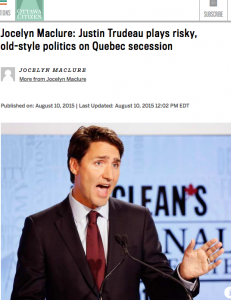One of the most striking features of yesterday’s referendum in the UK to leave the European Union is the significant generational split, with young people strongly favouring remaining. (This chart seems to be poll-based, but suggests that the only voters over the age of 55 favored leaving. Other polls suggest as much as 75% of 18-24 year olds wanted to remain.) This is a case where people at different ages clearly are in different interest positions. The quid pro quo on accepting EU immigrants to the UK is that UK citizens, in turn, have the right to live and work in other EU countries. This is a benefit that young people are much more likely to take advantage of than old people. (In fact, old people drawing pensions can continue to live pretty much wherever they like in Europe, the way Canadians live in Florida. It is young people who will feel the mobility restriction, because they will be unable to work.)
One might think that this raises a significant issue of fairness.… Continue reading

